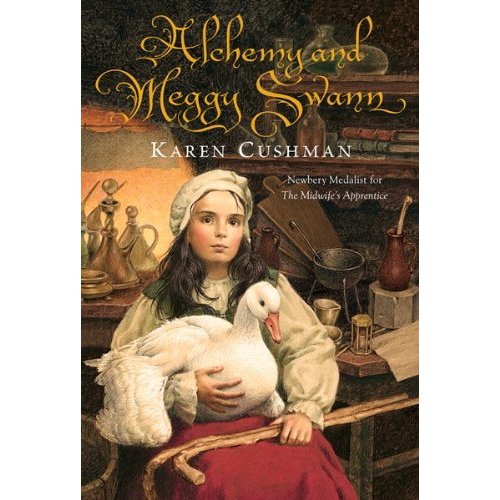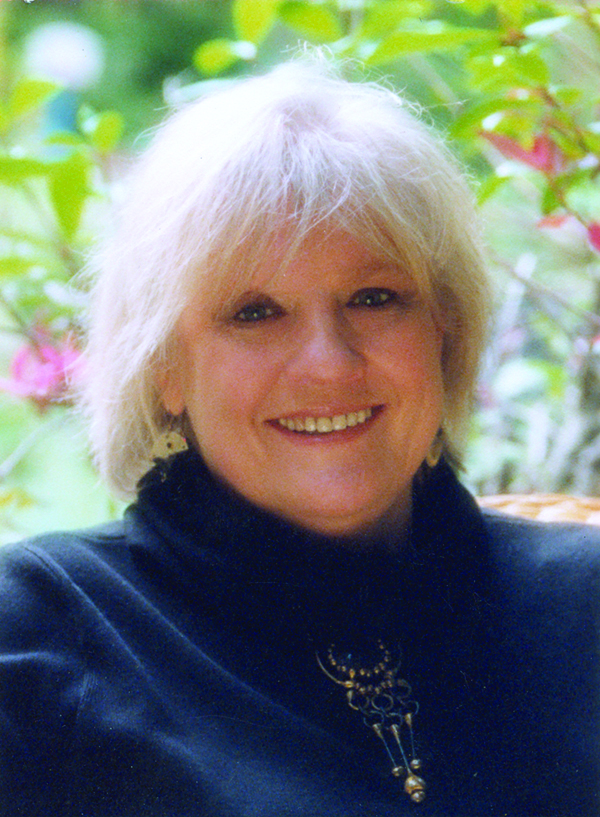Oh, this is so much fun! Not only is there a brand-new book out from one of my all-time favorite authors, but I got to read an early copy (squeee!) and interview the author for my blog (huzzah)!

First, let me gush a little about how much I enjoyed reading Alchemy and Meggy Swann. There’s an awful lot for readers of any age to love in this little book: from the opening scene where we start right in with action and a bit of a mystery, to the feisty but kind-hearted heroine, to the historical richness, to the wonderful array of creative insults. It’s truly got something for everyone. If you’re not already a fan of Karen Cushman, this book will surely transform you into one. And now, let’s meet the alchemist herself—welcome, Karen!

LT: First, I love the parallels between the father’s search for alchemical transformation and Meggy’s personal transformation. What made you start thinking about alchemy as a book subject, and was the parallel planned from the outset?
KC: I found alchemy an intriguing idea but didn’t really have an idea about how I’d use it in a book until I thought more about transformation, about that very parallel between alchemical and personal transformation. I love how the ides of change works for both and how transformation may not happen exactly as they wanted or expected.
LT: I think you really gave us an accurate portrayal at what it’s like to feel different and/or unwanted and the misguided but all-too-common defense mechanism of pushing people away before they can reject us, and it is these understandable flaws that make Meggy such an interesting and universally appealing character. Did you know you were shooting for that at the start, or did those aspects of character evolve naturally as you wrote the story?
KC: Meggy started out much sweeter and more compliant but as I understood more about her and her struggles, I realized she probably would not have responded or acted in such understanding ways. So, yes, those aspects of character evolved as I wrote the story.
LT: I find it fairly difficult (but extremely entertaining) to picture you hurling insults at anyone, but Meggy seems to have no trouble whatsoever. How exactly did you come up with Meggy’s many inventive invectives?
KC: I found an invaluable little book called Shakespeare’s Insults and borrowed some of those. And there is a website called the Shakespearean Insult Kit (www.pangloss.com/seidel/shake_rule.html) that allowed me to come up with intriguing combinations. It was great fun.
LT: I can tell you did a ton of research for this book. Do you think you’ll reuse any of it in future stories? Will we see Meggy again? (I need to see her reunited with her goose!)
KC: I hadn’t planned on a Meggy sequel but young readers have said they like the idea. First I’d have to finish a new book, Will Sparrow’s Road, where I will use a lot of what I learned about Elizabethan England.
LT: How about nonfiction? I’m a primarily nonfiction writer who dabbles in research-based fiction when something I’m researching gets my imagination going. Have you ever or do you think you will ever dabble in nonfiction? You’ve certainly got the research part down!
KC: So far it’s the “what if?” of stories that has my attention. I love sitting in my chair and making things up. But I dabble in nonfiction when I write my author’s notes. The notes for Meggy Swann were especially fun to do.
LT: I love that you “like to write about gutsy girls figuring out who they are,” and I love gutsy girls, even if some of us don’t get gutsy or figure out who we are until we’re actually middle-aged women (who, me?). Which real-life gutsy girls (and women) have inspired you most?
KC: Some of my female heroes are Jane Addams of Chicago’s Hull House, the anthropologist Margaret Mead, Eleanor Roosevelt, and genius illustrator Trina Schart Hyman—all gutsy girls.
LT: I’ve always said that I’ll feel like a successful writer when I receive one letter from a reader saying that my book helped them in some way, and you’ve said that connecting with readers is what makes you feel proudest of your work. What’s the best letter you’ve ever received from a reader?
KC: I got a wonderful letter that said, “I never read one of your books but now that you’ve come to my school, I am considering trying to read one.” But I treasure the ones that say “I never thought about that before but…” or “Since I read your book, I know there are other people who feel like I do.”
LT: Alchemy and Meggy Swann, even more so than your other books, I think, is a shorter book with more difficult language. Was there ever any question, from you or your publisher, about audience, age, and/or reading ability?
KC: No, I think Dinah, my editor, thinks as I do that we should give young people more credit for their understanding. And I tried to use words that could be understood through context or onomatopoeia. It was great fun searching thesauruses and the Oxford English Dictionary.
LT: I love that answer and completely share the belief that we should challenge and believe in children rather than sell them short. Since you mentioned Dinah, can you tell us what it’s like to work with the legendary Dinah Stevenson?
KC: Legendary? Is Dinah old enough to be legendary? I was assigned to work with Dinah when Clarion bought my first book–an amazing stroke of luck. Dinah is a great editor, intelligent, insightful, and not at all pushy, and she makes my work much better and richer than it would be without her. That doesn’t mean I don’t snarl and throw things when I get one of her famous 17-page editorial letters, and I don’t follow every suggestion she makes but I do think about them carefully. And she always reminds me it’s my book and I should write it my way.
LT: Age has nothing to do with it—only the esteem she’s earned within the industry! You’ve been very loyal to Dinah and to Clarion over the years (and I must admit that Clarion is one of my dream publishers!). They’re interesting because they’re a rather small imprint with a small list, but owned by a huge conglomerate. How do think this has helped or hurt you?
KC: I think Clarion’s small size has meant there’s a smaller list and fewer other authors. I can have a personal relationship with everyone on the staff and feel they know me. I like that. And I’m sure the support Clarion gets from Houghton Mifflin Harcourt benefits me in ways I don’t even know. So far I have felt no drawbacks.
LT: Finally, any advice for up-and-coming wanna-be’s?
KC: I tell most women who come to me for advice that they probably are just too young yet—I was fifty, after all, before I started writing. Beyond that I recommend what most writers do—lots of reading, much writing, critique groups, and support groups of like-minded folks like the SCBWI.
LT: Phew, that’s good to know—I’ve got a few more years yet. What a relief! Thanks so much, Karen. As always, it was wonderful to talk with you, made even more so by having such a delightful book to discuss.
** Disclaimer: I received a free advance review copy of this book from the publisher.
